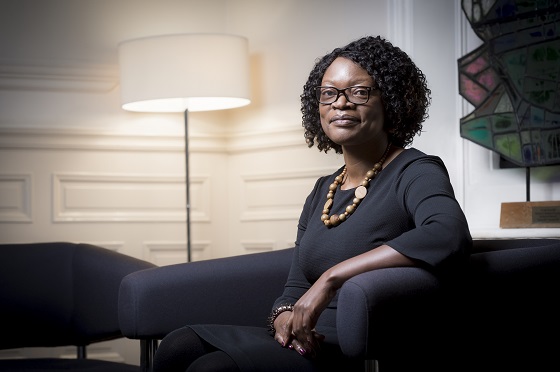The elderly can continue to live on their own and retain their independence as their loved ones remotely track their movements, thanks to digital technology tested by De Montfort University Leicester (DMU).
Researchers from the Faculty of Health and Life Sciences have studied electronic monitoring systems in the homes of those aged in their 70s and 80s suffering from a history of falls, social isolation or loneliness.

DMU's Professor Bertha Ochieng
Their daily routines were tracked using motion sensors attached to internal and external doors, as well as around the house on appliances such as kettles, toasters and ovens.
The system, which is called HOWZ, allowed nominated relatives to check in at any time via a mobile phone app and weekly reports were sent to GPs.
Alerts were also sent if there was any change to the person’s regular routine, for example if they didn’t switch the kettle on to make a hot drink at the usual time.
And if something out of the ordinary was detected, like not leaving the bedroom at the expected time, notifications were also generated to raise the alarm something might be wrong.
The six-week study ended in all participants asking if they could keep their monitoring systems. It also found how families were given peace of mind and how the elderly were encouraged to stay in their own homes for longer because of the reassuring safety net.
It comes as DMU has teamed up with healthcare and industry professionals to launch its new Digital Health and Care Unit to promote the use of the latest technology to manage illnesses and health risks.
Bertha Ochieng, Professor of Integrated Health and Social Care at DMU, said families were able to trace exactly what their relatives had been doing and quickly detect any changes in routine.
She said: “Before the start of the study, all participants had spoken about their reluctance to go to a GP. They didn’t want to bother a GP or cause worry for their family members.
“They had their own routines, they were very independent and had the most amazing resilience, but they were wary about asking for help.
“Then in just six weeks everything changed. They accepted and embraced the technology, saying they felt more relaxed as someone would know if there was a problem. They said knowing the sensors were there reassured them and made them feel better about themselves.”
Three families took part in the DMU research project; which included three patients aged 77, 78 and 82, and four of their next-of-kin.
The HOWZ service-improvement project found that the technology improved quality of life for the elderly and aided understanding of their daily living. It also monitored and co-managed people’s risk trends.
One participant said: “It used to play on my mind that if something happened I couldn’t get to the phone, but with these sensors my family will know if I haven’t moved for a while.”
Other participants commented: “I feel like I am being looked after and it makes me feel safe,” and “I’m safeguarded, I don’t feel as anxious.”
Families were also full of praise for the technology saying they felt more involved in the care of their relatives. Families made comments such as: “It’s a brilliant idea” and “It’s allowed independence while maintaining family links.”
RELATED NEWS
DMU focuses on digital health as the future of healthcare
Research finds higher levels of paranoia & mental health problems among low-income workers
Students at DMU working to improve cancer care
The findings of the study were all the more important because the UK population is living longer and providing ever-increasing pressures on healthcare resources.
Professor Ochieng said the use of digital monitoring was a good way to check on people’s routines because the information offered a high level of detail and little expense.
She added: “Digital technology is moving so quickly, but we are still trying to catch up in healthcare.
“Going forward we want to embrace technology opportunities, particularly preventative approaches via technology.”
The findings of the study, called ‘Assessing the feasibility of using Howz sensors with older adults’, are to be presented at a European Public Health Conference in Slovenia.
Posted on Friday 29 June 2018